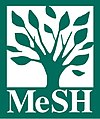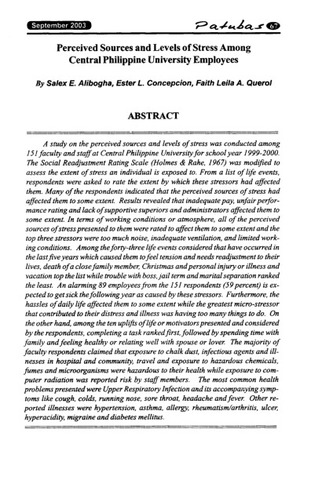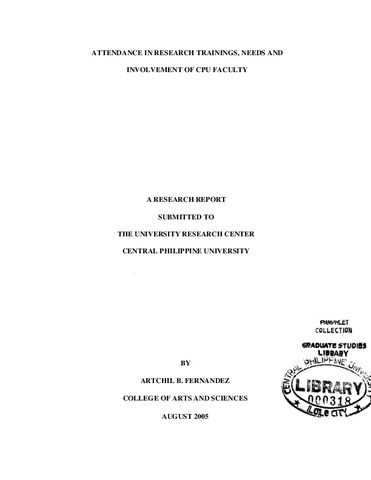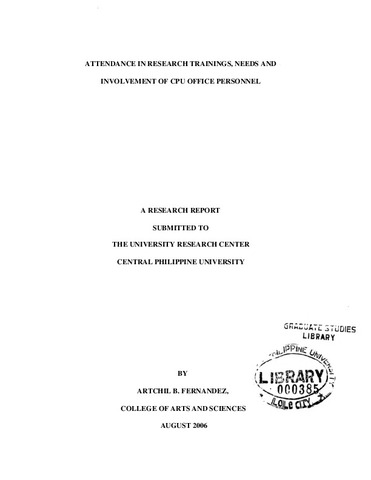Perceived motivators of participation in professional advancement programs among nursing instructors of Central Philippine University

Page views
421Date
2008Author
Thesis Adviser
Defense Panel Chair
Share
Metadata
Show full item record
Abstract
This study aimed to determine the perceived motivators of participation in professional advancement programs among nursing instructors of Central Philippine University. Specifically, this investigation sought to describe the personal characteristics of the nursing instructors in terms of their age, sex, civil status, years of experience, monthly gross salary, educational attainment and spouses’ educational attainment and occupation; determine the respondents perceived extent of influence of motivators and extent of participation in professional advancement. This study also aimed to determine whether or not there is an association between the respondents’ perceived extent of influence of motivators and their extent of participation in professional advancement programs and the respondents perceived extent of influence of motivators and their personal and spousal selected characteristics.
A total enumeration of the 110 full-time nursing instructors of Central Philippine University was done. The main instrument used in this study was a 14-item questionnaire about the extent of influence of different motivators and the respondents’ participation in professional advancement programs.
Frequency distributions and means were used to draw the profile of the respondents. In ascertaining the degree of association between variables, Chi-square and Gamma Coefficient were used.
Major Findings
The results of the study revealed that the majority of the respondents perceived that professional development job security and personal non-monetary benefits motivator have very high extent of influence in their participation in professional advancement programs. Other respondents perceived economic motivators to moderate extent of influence on their participation.
The study further showed that perceived extent of influence of the motivators is not significantly associated with the instructors’ extent of participation in professional advancement programs. The study also revealed that except age, all the other variables, such as sex, civil status, years of experience, monthly gross salary and educational attainment and spouses’ educational attainment and occupation were not significantly associated with the nursing instructors’ perceived extent of influence of motivators on their participation in professional advancement.
The nursing instructors’ perceived professional development influenced their participation in professional advancement programs.
The extent of participation in professional advancement programs among respondents was high, particularly in seminars or workshops but not so much in symposium or conferences.
The nursing instructors’ perceived extent of influence of different motivators and their extent of participation in professional advancement programs were found to be not associated with each other.
The data further revealed that the respondents’ characteristics such as sex, civil status, years of experience, monthly gross income, educational attainment and spouses’ characteristics such as educational attainment and occupation did not have any bearing on their perceived extent of influence of motivators. However, age was significantly associated with the respondents’ perceived extent of influence and extent of participation in professional advancement programs.
Conclusions
Based on the aforesaid findings, the following conclusions were formulated
1. Professional advancement, job security, personal non-monetary benefits have a very high extent of influence on their participation in professional advancement programs, however economic motivator influence their participation to a high extent only.
2. Participation in professional advancement programs was high, specifically in seminars or workshops. Participation in symposia or conferences and in-house faculty development programs, however, was low.
3. Personal characteristics of the nursing instructors, such as sex, civil status, years of experience, monthly gross salary, educational attainment, spouse’s educational attainment and spouse’s occupation did not also have a significant bearing on the respondents’ perceived extent of influence of motivators and extent of participation in professional advancement programs. Age however was significantly associated with the nursing instructors’ perceived extent of influence of economic motivator and extent of participation in professional advancement programs.
4. The nursing instructors’ perceived extent of influence of motivators and extent of participation in professional advancement programs were not significantly related to each other
Description
Abstract only
Suggested Citation
Rodriguez, L. H. (2008). Perceived motivators of participation in professional advancement programs among nursing instructors of Central Philippine University (Unpublished Master's special paper). Central Philippine University, Jaro, Iloilo City.
Type
Special paperSubject(s)
Keywords
Department
School of Graduate StudiesDegree
Master in NursingShelf Location
GSL Theses 610.73072 R618
Physical Description
xi, 79 leaves
Collections
- Master in Nursing [37]
Related items
Showing items related by title, author, creator and subject.
-
Perceived sources and levels of stress among Central Philippine University employees
Alibogha, Salex E.; Concepcion, Ester L.; Querol, Faith Leila A. (Central Philippine University, 2003-09)A study on the perceived sources and levels of stress was conducted among 151 faculty and staff at Central Philippine University for school year 1999-2000. The Social Readjustment Rating Scale (Holmes & Rahe, 1967) was ... -
Attendance in research trainings, needs and involvement of CPU faculty
Fernandez, Artchil B. (Central Philippine University, 2005-08)The study was conducted mainly to determine the attendance in research trainings, needs and research involvement of CPU faculty. It utilized a one-shot survey design. Using Slovin’s formula, a sample of 206 faculty members ... -
Attendance in research trainings, needs and involvement of CPU office personnel
Fernandez, Artchil B. (Central Philippine University, 2006-08)The study was conducted mainly to determine the attendance in research trainings, needs and research involvement of CPU office personnel. It utilized a one-shot survey design. Using census technique (total enumeration), ...





